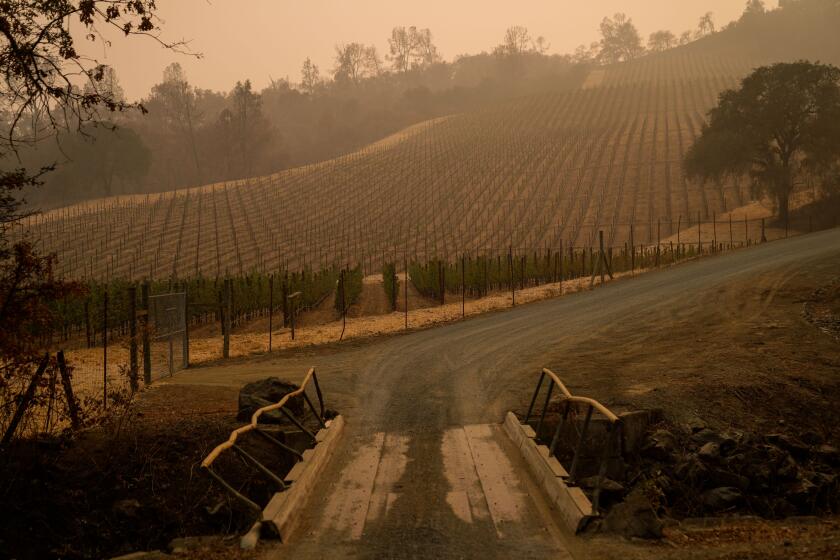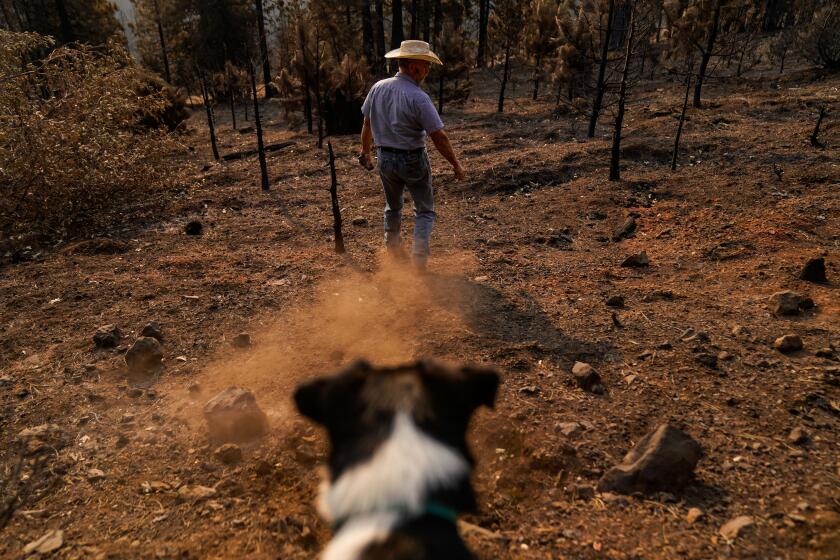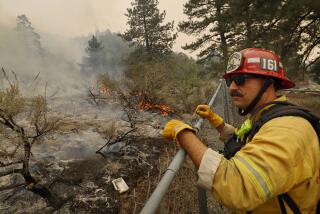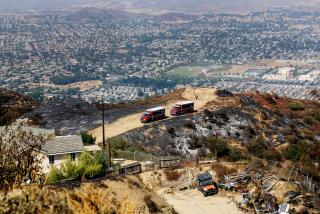California wildfires on the cusp of burning 4 million acres so far this year
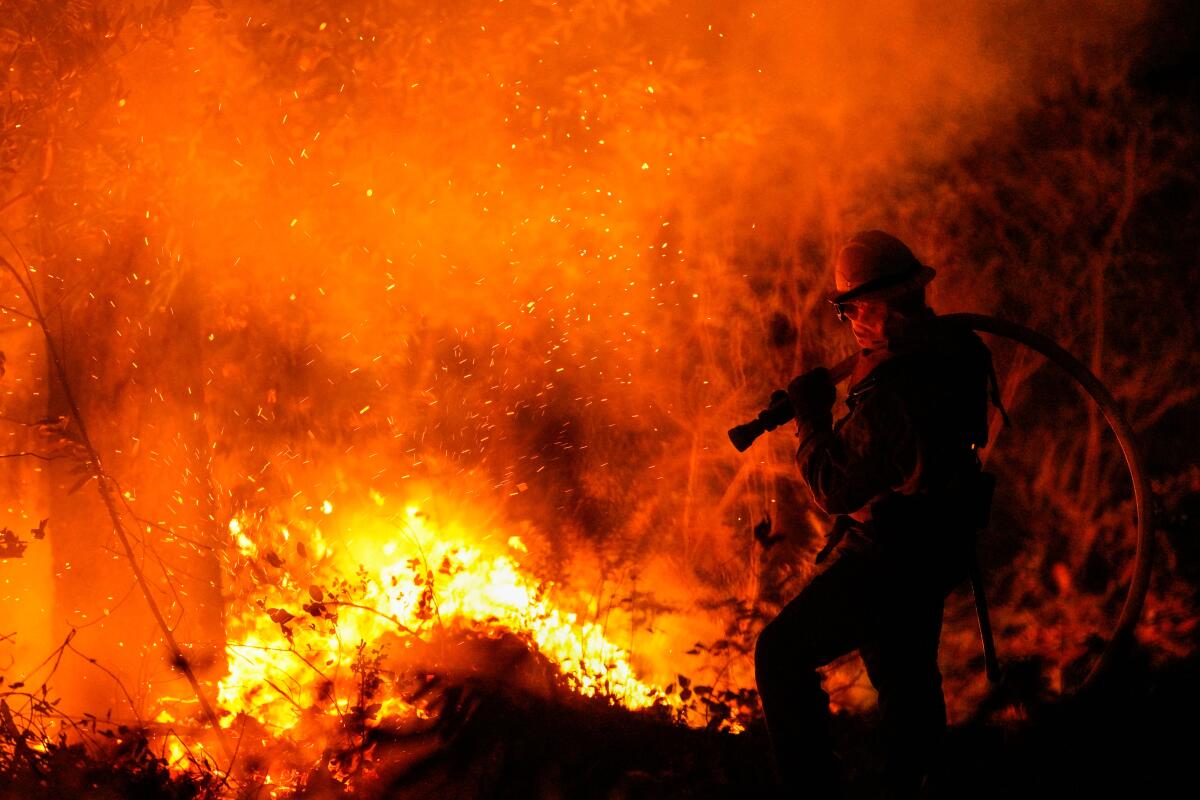
- Share via
Wildfires have burned an unprecedented swath of California this year, scorching nearly 4 million acres — an area larger than Connecticut — and killing 31 people, according to the California Department of Forestry and Fire Protection.
Previously, California’s worst year of fire was 2018, when more than 1.8 million acres were burned and more than 100 people were killed, according to the National Interagency Coordination Center.
Fires this year have destroyed more than 8,200 structures and, as of Friday, had displaced more than 53,000 from their homes.
The property damage toll has not yet approached that of 2018, when more than 17,000 homes and 700 businesses were destroyed.
Still, the sheer magnitude is staggering. Of the 20 largest wildfires in California’s history, five burned within the space of a couple months this year, consuming a combined total of nearly 2.4 million acres.
Lightning in August ignited many of California’s biggest blazes, but scientists say climate change has also contributed to the conflagrations. It was the hottest August on record in California, and trees and brush were already abnormally dry and combustible after northern and central California saw exceptionally dry conditions last winter.
On Friday afternoon, two inmate firefighters were injured fighting the Zogg fire in Shasta County.
The firefighters were flown by helicopter from a steep area in the northern zone of the fire to a local hospital, incident commander Sean Kavanaugh said Saturday at a news conference.
One was released Friday night, while the other remained hospitalized Saturday, Kavanaugh said. Cal Fire declined to provide more information about what happened.
Crews reported little growth on the 56,305-acre fire overnight but were bracing for west-northwesterly winds to pick up later Saturday, said Christina Barkdull, public information officer for Cal Fire.
“We’ve put a lot of resources out there on certain divisions, just to be on the safe side,” she said.
People have returned to their homes in many areas at the southern edge of the fire over the last couple days, as containment rose to 66%, she said.
“The north end of the fire, that’s kind of the priority right now because it’s burning in a lot of chaparral, the oak woodlands,” she said. “But we put in a lot of contingency lines, where if something were to happen we’re able to box that fire in.”
The fire ignited early Sunday near the community of Igo, about nine miles southwest of Redding, and spread rapidly, killing four people and destroying at least 179 structures.
About 140 miles south in Northern California’s wine country, crews battling the Glass fire were breathing a sigh of relief Saturday morning after expected strong winds failed to materialize overnight.
Other than a small spot fire that was quickly extinguished, the 62,360-acre fire’s footprint remained largely unchanged overnight, said Donna Sager, public information officer with Cal Fire.
Still, she said, hot, dry conditions are expected to remain a challenge.
Fire experts use a calculation called the probability of ignition that’s based on fuel moisture and weather condition, she said.
“Right now, it’s at 90,” she said, “which means any live vegetation that has an emission source, a cigarette, whatever, has a 90% chance of carrying fire through it. Not that it will sit there, smolder and go out but that it will actually carry fire.”
Another challenge is that it has been too “socked in,” or smoky, to have aircraft drop water on the flames, she said, although there was hope that could change Saturday.
Help also arrived Saturday from Oregon, where wetter conditions have permitted fire crews to get the upper hand on several blazes, freeing up resources to be sent elsewhere, she said.
Crews reported 15% containment of the 63,450-acre Glass fire, which started Sept. 27 and quickly spread, gaining a foothold in a wedge of land north-northeast of Santa Rosa that hadn’t burned for 70 years. The blaze has destroyed at least 173 homes and 264 commercial buildings in Napa County and 120 homes and eight commercial buildings in Sonoma County, Sager said.
Smoke from California wildfires has ruined the 2020 vintage for some wineries
The largest fire in the state’s history continued to burn in Mendocino County, prompting new evacuation orders Saturday, nearly 50 days after it was sparked by lightning in mid-August.
The August Complex fire was 984,804 acres and still just 51% contained.
About 2:30 a.m. Saturday, flames made an aggressive downhill run in a rural area north and east of the Round Valley, spurring officials to change an existing evacuation warning to an order “out of an abundance of caution,” said A.J. Lester, public information officer with Cal Fire Team 5, which is handling the west zone of the massive blaze.
The area is not densely populated but is dotted with farms and ranches, he said.
Although a red-flag warning for the area due to the possibility of high winds expired Friday at 8 p.m., winds and the terrain were continuing to push the fire toward containment lines, particularly above the Round Valley area, Lester said.
“We’re really trying to reinforce those containment lines to make sure we don’t get any jumps or breaches,” he said.
Crews were also working to protect the community of Zenia, to the north, after the fire made a run in that direction, he said.
Firefighters have strengthened containment lines along the fire’s northern flank, allaying some of the concern that the blaze could merge with the Zogg fire and form a monster conflagration well over 1 million acres in size, said Cody Norris, public information officer with U.S. Forest Service, on Saturday.
Authorities want communities to evacuate from the approaching August Complex fire, but some weed growers are staying put, with lucrative buds close to harvest time.
“I’m not going to say never, but right now things are looking pretty good on those two fronts,” he said.
One challenge was that flames were mostly burning through big, dried-out conifers, which don’t quickly recover from drought and low humidity.
“Something like a big tree takes roughly 1,000 hours to go from a high moisture content down to a very low moisture content so it’s not a very quick change,” he said. “So even if we got heavy rain, it’s not going to immediately soak up all that water.”
There were more than 3,500 firefighters battling the fire, including firefighters from Montana, Texas, Washington and New Jersey, as well as 138 National Guard personnel, Lester said.
“With such a large operation, there’s a lot of moving parts as far as evacuations go and trying to educate the public,” he said.
Fire officials have reported 100% containment of two other large complexes of fire that were sparked by lightning in mid-August — the 396,624-acre SCU Lightning Complex fire in Santa Clara, Alameda and Stanislaus counties, and the 363,220-acre LNU Lightning Complex fire in Napa, Sonoma, Lake, Yolo and Solano counties.
Fire crews on Saturday reported progress against the Creek fire burning in the Sierra National Forest, which was 312,063 acres and 49% contained.
The North Complex fire, which killed 15 people after it raced into the towns of Berry Creek and Feather Falls, was 317,459 acres and 83% contained.
The North Complex fire killed this rancher’s herd of cattle, and five generations of a family legacy. He blames forest management, climate change and the politics of division.
In the Los Angeles area, crews fighting the Bobcat fire in the Angeles National Forest said they were mostly focusing on mopping up and strengthening containment lines Saturday. Fire officials said a 300-acre internal island of unburned fuel northeast of Mt. Wilson was expected to burn throughout the day Saturday, possibly sending up a large cloud of smoke.
The fire had burned 114,963 acres, was 84% contained and had destroyed 87 homes and 83 other structures Saturday, though that number could rise as teams continue to perform damage assessments, officials said.
The fire was continuing to wreak havoc on the region’s air quality, with officials forecasting it would be unhealthy Sunday for those in parts of the San Gabriel and San Fernando valleys, as well as the San Gabriel Mountains, and unhealthy for sensitive people in many other places in Los Angeles County.
Those with heart disease, asthma or other respiratory conditions were advised to limit outdoor activities, the county Department of Public Health said in a news release.
More to Read
Sign up for Essential California
The most important California stories and recommendations in your inbox every morning.
You may occasionally receive promotional content from the Los Angeles Times.
